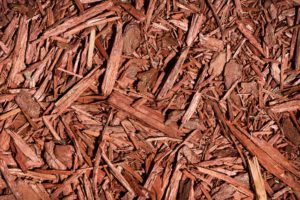
Wood chips are one of the primary types of organic garden mulch.
Mulch can be a huge time-saver, no matter what type of garden you are creating. When applied correctly, mulch reduces weeds, conserves soil moisture, moderates soil temperatures, reduces soil compaction, protects plants from equipment injury (lawnmowers and weed trimmers), and minimizes soil erosion. This results in healthier fruits, vegetables, and flowers. It is important to select the best mulch for your needs. While most mulch wards off pests and weeds equally well, some will cater to the needs of specific plants, trees, or other crops. Before you lay down your mulch, read on to learn about the numerous types of organic and inorganic garden mulch you may apply.
Wood Chips or Shredded Leaves
One type of garden mulch is decorative wood chips or shredded bark. If you have trees, shredding their fallen leaves can also create nutrient-rich mulch at no extra cost.
You can spread wood chips or shredded leaf mulch anywhere on your property, but they often look best in flower beds, shrub borders, and garden pathways. Use caution when applying fresh wood chips since the microbes that break them down will steal nitrogen, one of the soil macronutrients from the soil, and leave your plants with nitrogen deficiency.
Pine Needles
Pine needles, also called pine straw, are slow to decay, are attractive, and add fragrance to the landscape.
Grass Clippings
Grass clippings are also readily available to most homeowners. These organic clippings from your lawnmower can be left on your lawn as a natural lawn fertilizer. If you have excess grass clippings, you can use them as nitrogen-rich mulch for vegetable gardens. Do not use lawn clippings from a lawn that has been treated with herbicides.
Compost
If you have extra compost to spare, use it for mulch. Compost as garden mulch adds nutrients and organic matter to the soil.
Straw or Hay
If you’re creating a vegetable garden, consider covering it with straw, salt hay, or weed-free hay. This will look clean and crisp while retaining moisture, preventing weeds, and adding organic matter when breaking down. Make sure to opt for weed and seed-free hay and avoid piling it around the stems of a vegetable or fruit tree to prevent slug and rodent damage.
Plastic Mulch
Mulching a vegetable garden with sheets of black plastic film can be surprisingly beneficial. When this film is tightly spread over a smooth soil surface, the plastic transmits the sun’s heat to the soil underneath. This creates a microclimate that’s about three degrees warmer than an un-mulched garden.
The plastic remains warm and dry, so it easily protects the fruits of vining crops like strawberries, melons, and cucumbers from rotting. This form of garden mulch also prevents weed growth and retains soil moisture.
Landscape Fabrics
Geotextiles, or landscape fabrics, let air and water pass through to the soil beneath. However, geotextiles do degrade over time when exposed to light. To make them last longer, you can cover them with organic mulch.
Landscape fabric is advertised to stop weeds from germinating. Unfortunately, this is not entirely true. If weeds do germinate, they will be difficult to remove when their roots are entwined in the fabric.
Scientific Plant Service Is Your Go-To Source In Landscape Healthcare
Scientific Plant Service, located in Baltimore, is a privately owned corporation, chartered in Maryland in 1957 by Frank J. Burke. We started as a full-service Arborists specializing in the care of shade trees and ornamental shrubs, but today we are a Lawn Care company that is a huge part of the community. From aquatic environments and snow management to deer and mole control, SPS has services tailored specifically for your lawn and landscape.
We offer services in Maryland, Washington, DC, and Virginia, including: Harford, Baltimore, Carroll, Frederick, Howard, Anne Arundel, Montgomery, Prince Georges, Talbot, Queen Anne’s, Calvert counties in MD, as well as Loudoun County, Fairfax County, Arlington, Alexandria, and Falls Church in VA. For more information, contact us online, or call us at 410-321-0970. Be sure to follow us on Facebook, Twitter, LinkedIn, and Pinterest!

